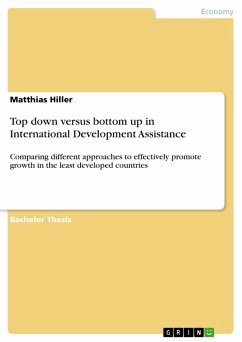Bachelor Thesis from the year 2010 in the subject Business economics - Business Management, Corporate Governance, grade: 1,0, Otto-von-Guericke-University Magdeburg, language: English, abstract: Helping less developed countries close the gap to industrialized countries is the goal of a decades long struggle by various institutions likes the IMF, World Bank and NGOs. The various approaches that exist highly differ in the level of society they address. This paper scales the different development measures from top-down to bottom-up - whereas Structural Adjustment Policies (SAP) employed by the IMF are counted as the former and Unconditional Cash Transfers mark the lower end of the scale - to check their respective effectiveness in promoting growth and lasting development. In between the extremes of the scales, light is shed on the Poverty Reduction Strategy Papers (PRSPs) of the IMF, the approach to have the people in need participate in the disbursement of aid (Participation), as well as the usefulness of the Conditional Cash Transfers. Through the absence of substantial savings, poverty prevents the accumulation of capital and the needed investment for productivity growth. By failing to attract investment, Participation is found to do little to break this vicious circle and lift the least developed countries out of the poverty trap. SAPs embodied the right idea but were to rigorous and paying to little attention to the local conditions present. PRSPs seem a well-working successor to the SAPs by involving the recipient. Cash transfers are economically and ethically promising, but entail the risk of inflation and have no effects on under-investment in infrastructure necessary for supporting large-scale growth. Only a combination of bottom-up and top-down measures presents effective development assistance.
Dieser Download kann aus rechtlichen Gründen nur mit Rechnungsadresse in A, B, BG, CY, CZ, D, DK, EW, E, FIN, F, GR, HR, H, IRL, I, LT, L, LR, M, NL, PL, P, R, S, SLO, SK ausgeliefert werden.









